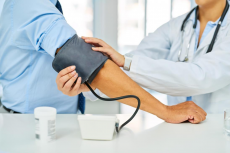

Hypertension
What is hypertension? It is high blood pressure, described as the “level of blood pressure above which the use of antihypertensive therapy does more good than harm.” Normal blood pressure is 120/80 mmHg. High blood pressure is 140/90 mmHg.
You can measure your blood pressure using an ambulatory blood pressure monitor in the clinic or using a home blood pressure monitor. The blood is measured through the brachial artery in your arm. You begin by putting a cuff around your arm and inflating it; this stops blood from flowing through the brachial artery. Then you open the valve and deflate the cuff and blood can begin to flow through. As blood flows through you can hear a turbulent sound (called a korotkoff sound), this is the systolic pressure, when there is no sound it is the diastolic pressure. Systolic pressure is when the heart is contracting, diastolic pressure is when it is relaxing. The time average spend in systole can be used to work out the blood pressure. We spend 2/3rds of our time in diastole, this decreases with exercise.
The exact primary causes of high blood pressure are not known and it is assumed that it is a complex disorder. However, several diseases can cause hypertension, such as renal disorders, endocrine disorders and some drugs can influence it too, for example steroids.
Having high blood pressure can increase your risk of stroke, aortic aneurysm, renal failure and heart failure.
Some symptoms:
Dizziness
Headache
Flushing
Awareness of heartbeat
None – this is the worst, not knowing you have high blood pressure could mean that lifestyle choices can worsen state of health.
Some signs: (what the Clinician can identify)
Level of blood pressure using monitors, looking for blood pressure that is consistently high, not a one off as other factors can cause high blood pressure
Abnormal renal function
Urine tests- things that shouldn’t be present in urine found
Echocardiogram- identification of an abnormally enlarged heart
How to manage high blood pressure
Before being given any medical treatment, it is good to try and deal with it naturally. So firstly, we need to be educated on how to deal with high blood pressure and then make some lifestyle changes. This could be stopping smoking, losing weight, changing diet, reducing salt intake, exercising and attending relaxation therapy. For some people, it may be too late and they will immediately need to go on medication, however doing the above will still be beneficial. Drug treatment will be the solution for the majority but in some cases surgery may be an option.
What determines blood pressure?
Blood pressure is determined by cardiac output and total peripheral resistance (TPR). The diameter of the arterioles determines the TPR. Cardiac output is based on heart rate and stroke volume. Stroke volume is the amount of blood each beat pumps out, it is determined by filling pressure and contractility.
There are two main mechanisms for controlling blood pressure: the sympathetic nervous system using the baroreceptor reflex and the extracellular fluid volume with renin activity.
Image- https://www.medicalnewstoday.com/articles/159283.php

0 Comment:
Be the first one to comment on this article.